From April 22nd to 30th, Tan Zhen, the Party Secretary of Kaifeng University, led a delegation consisting of Party Committee member Xie Wenzhong, Director of the Medical Department Li Yong, Dean of the School of Foreign Languages Cheng Xin, and Vice Dean of the School of International Education Huang Yiqin to visit partner universities and enterprises in Japan and South Korea.
On April 24th, the delegation visited Chiba University of Science and Technology. Vice President Hosokawa Masaki, Director of the International Exchange Center Zhang Chengsheng, and other relevant leaders warmly received them. During the symposium, Tan Zhen introduced the basic situation of Kaifeng University and the achievements made in international cooperation and exchanges. Professor Xie Wenzhong introduced the development history and characteristic specialties of the Medical Department of Kaifeng University. Both sides focused on the disciplinary characteristics and advantageous specialties of the two universities for in-depth exchanges and visited the Department of Pharmacy, the Department of Crisis Management, and the Department of Nursing. Through this visit, both sides reached a consensus on cooperation in the fields of pharmacy and nursing, laying the foundation for future cooperation. Chiba University of Science and Technology is the only university in Asia that has established a discipline of crisis management.
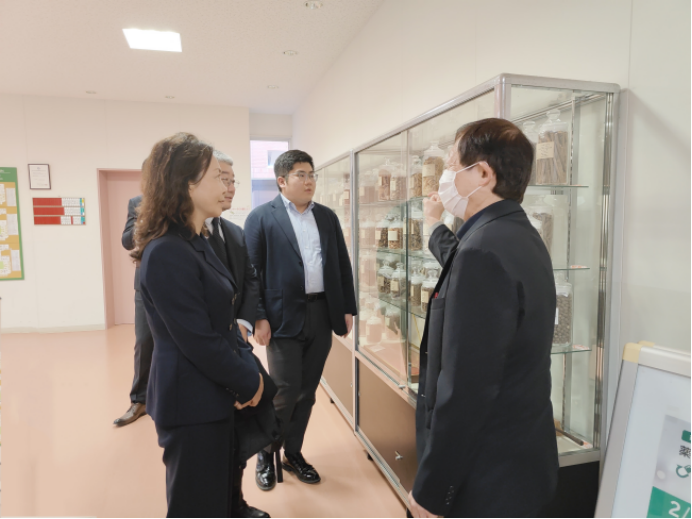
The delegation visited the pharmacy training room.
On April 25th, the delegation visited the University of Tokyo and toured the library, the Medical Department, and the Engineering Department, experiencing the rich academic atmosphere and profound humanistic atmosphere of this world-renowned university and feeling its unique campus culture.
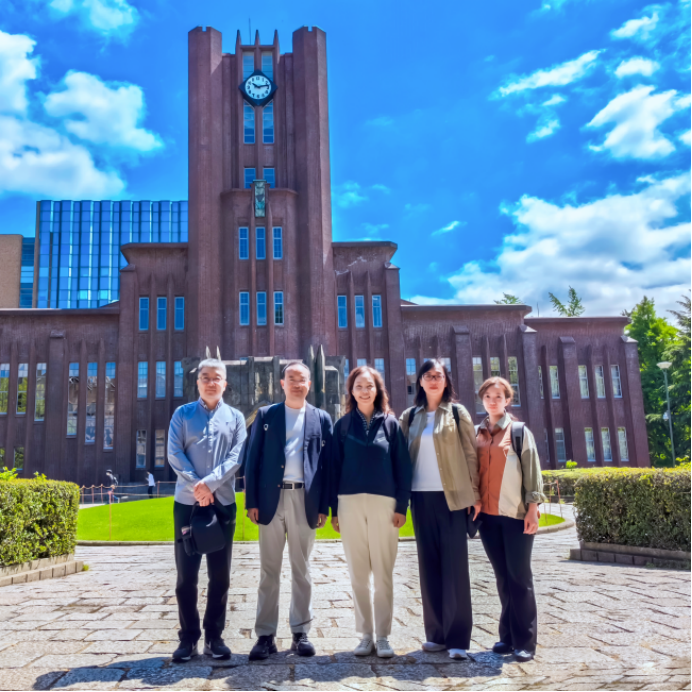
The delegation visited the University of Tokyo.
On the morning of April 26th, the delegation visited Osaka University of Tourism, a partner university, for exchanges. Since signing the cooperation agreement in 2019, more than 30 students from Kaifeng University have continued their studies at Osaka University of Tourism to pursue bachelor's degrees.
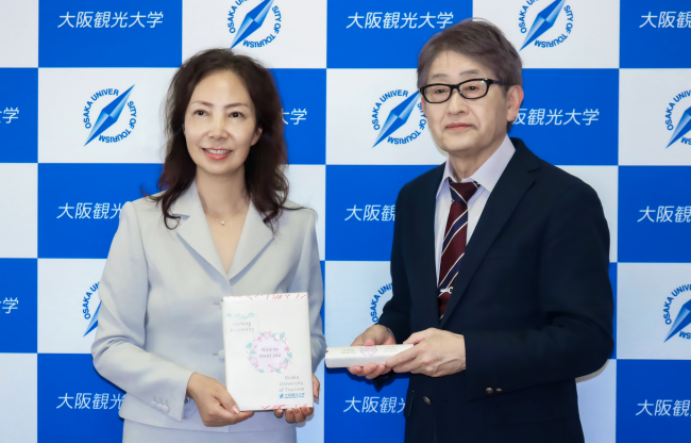
Party Secretary Tan Zhen and President Yamauchi Yoshitaka of Osaka University of Tourism
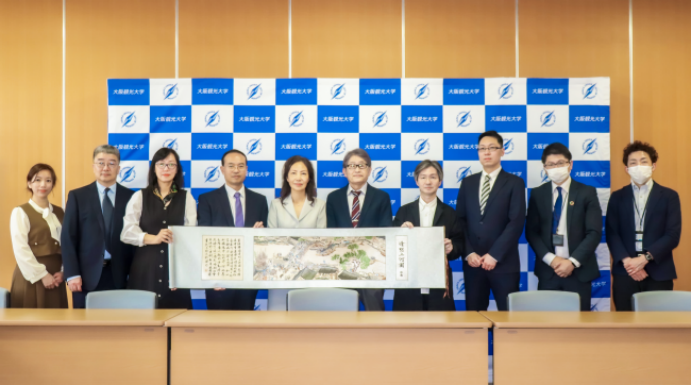
Group photo of representatives from both sides
Kaifeng and Osaka are both historical and cultural cities. Tan Zhen introduced the long history and culture of Kaifeng, an ancient capital of eight dynasties, and the development history of Kaifeng University to Osaka University of Tourism. Both sides had in-depth discussions on cultivating compound tourism talents for the world and reached a consensus on the educational philosophy and new models of talent cultivation. After the meeting, they visited the school's library, classrooms, dormitories, cafeteria, and student service center.
Finally, the delegation visited the students studying for bachelor's degrees at the university in Japan and held a symposium. At the meeting, the students reported on their studies and lives and offered suggestions and opinions on the educational and teaching reforms of their alma mater. Tan Zhen encouraged the students to be goal-oriented, plan their studies and lives in Japan well, cultivate cross-cultural communication skills and social service capabilities, and handle the relationship between study and practice well to achieve unity of knowledge and action, bringing honor to their alma mater and the country.
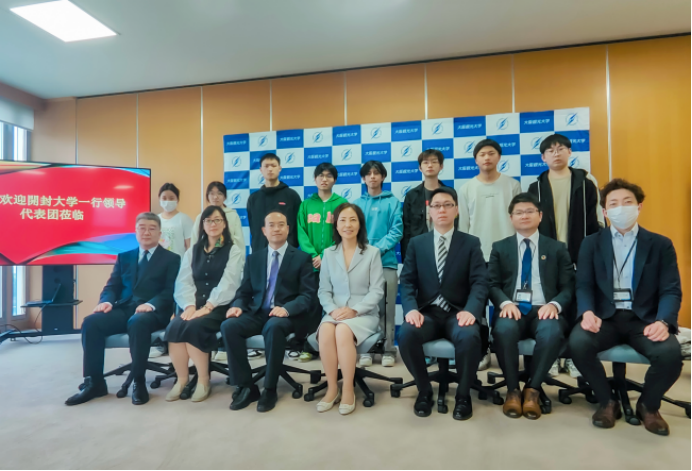
Group photo of representatives from both sides of teachers and students
In the afternoon of April 26th, the delegation had in-depth exchanges with the representatives of KIJ Language Institute. Both sides introduced the development history and educational characteristics of their respective schools and exchanged views on the cultivation of Japanese language professionals, curriculum settings, joint construction of teaching staff, and exchanges of teachers and students, reaching multiple cooperation intentions and opening a new starting point for cooperation.
On April 27th, the delegation conducted overseas enterprise visits and job openings, having in-depth exchanges and discussions with Chairman Jin Gu Jin of World Human Co., Ltd. and Chairman Ji Heng of Zhongxing Co., Ltd., to understand the employment situation of international students in Japan and the employment market demand in Japan, and held talks on the overseas employment of students, reaching a cooperation intention on overseas internships and employment for students.
On April 29th, the delegation visited Daegu Catholic University in South Korea. President Seong Han Ki, Director of the International Office Yoon Jong In, and Director of the International Exchange Center Song Do Jin warmly received them.
Both sides introduced the school's educational achievements and development plans and had in-depth discussions on Sino-foreign cooperative education, academic research, student exchanges, and teacher visits, reaching a high consensus on strengthening inter-school cooperation and signing a memorandum of cooperation.
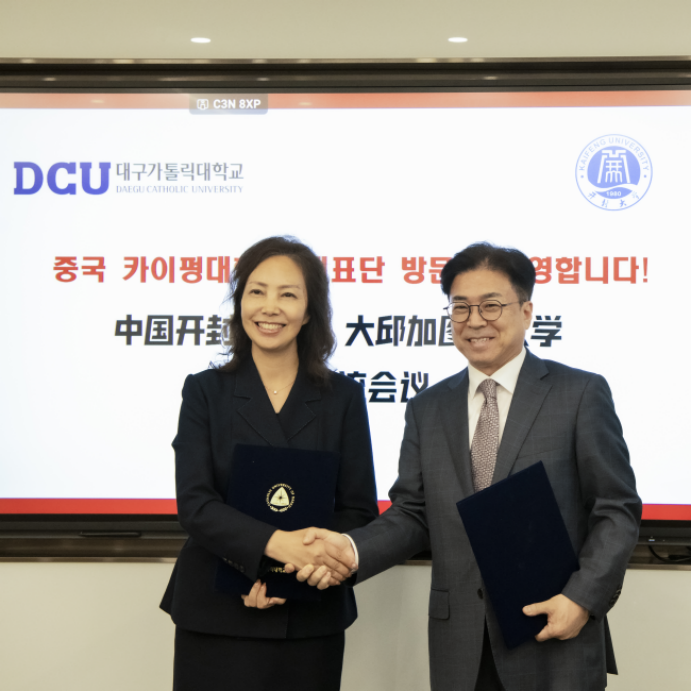
Secretary Tan Zhen and President Sung Han-ki of Daegu Catholic University
Secretary Tan Zhen and President Sung Han-ki of Daegu Catholic University led the visiting delegation to tour the university's museum, history hall, library, and Innovation Academy. They also inspected the Behavioral Hearing Assessment Laboratory, Language Motor Disorders Laboratory, Language Clinical Diagnosis Laboratory, and Auditory Evoked Potential Laboratory.
Daegu Catholic University was founded in 1914 and is the earliest and largest comprehensive university in the Yeongnam region of South Korea. Its medical program ranks third in the country.
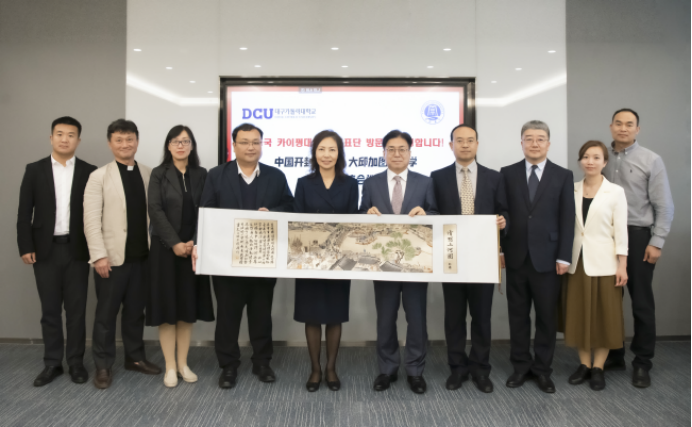
Group photo of representatives from both sides
The delegation's visit to Japan and South Korea has further promoted the exchange and cooperation between Kaifeng University and universities and enterprises in Japan and South Korea. It has actively explored new models of cooperative education such as "Medicine + Japanese/Korean", "Tourism + Japanese/Korean", and "Artificial Intelligence + Japanese/Korean", broadened cooperation in cultural exchanges between teachers and students in Japan and South Korea, and is of great significance for opening up a new situation of high-level international cooperation and exchanges for the university and promoting its high-quality and connotative development in an international context.
 search
search
 search
search